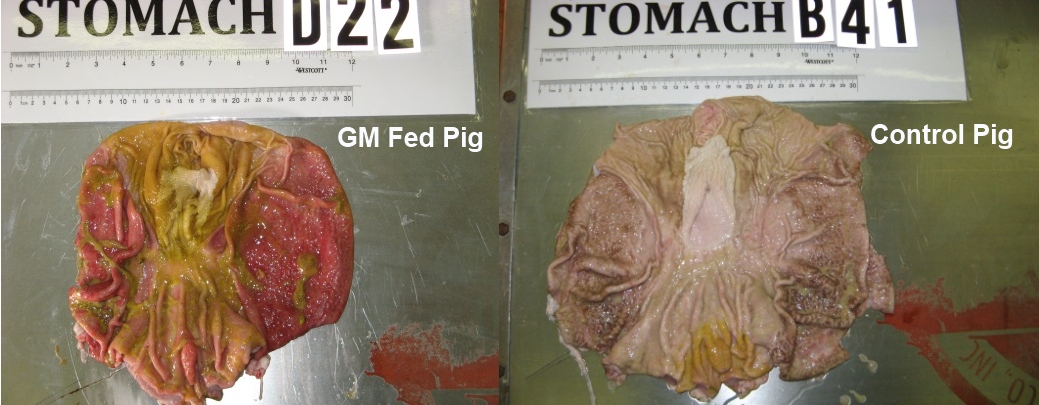The Rich, Perverse and Powerful,eat the best organically grown food. While feeding the rest of the ignorant American public poisonous health ravaging GMO garbage. Americans unbeknownst to them are actually being used as Guinea Pigs. The companies that produce this altered product are refusing to label it as GMO product. Probably because they know most American’s wouldn’t buy it. So in essence we are being forced to eat foods that we don’t want to eat. This in my opinion is just another clear example of the gradual emergence of a Fascist/Socialist state, led by sexually perverse liberals, in positions of power and influence, who seek to control everything, from what we eat, to what we speak, to how we think, live and believe. It’s becoming quite clear that the American people are gradually losing power and are no longer in charge. But a gradually emerging Fascist/Socialist government that seeks complete power and absolute control. More information about poisonous GMO’s and their harmful, damaging effects, can be found at the links and article below.
Related Information
The Dangerous Practice Of Genetically Modifying Your Food.
Trans Humanism: Mans Foolish Blind Rush To Make Himself Equal With God?
By Donald Bohanon
Evidence of GMO harm in pig study
A groundbreaking new study [1] shows that pigs were harmed by the consumption of feed containing genetically modified (GM) crops.
Find a clear summary of the study here
GM-fed females had on average a 25% heavier uterus than non-GM-fed females, a possible indicator of disease that requires further investigation. Also, the level of severe inflammation in stomachs was markedly higher in pigs fed on the GM diet. The research results were striking and statistically significant.
Lead researcher Dr. Judy Carman, adjunct associate professor at Flinders University, Adelaide, Australia,[2] said: “Our findings are noteworthy for several reasons. First, we found these results in real on-farm conditions, not in a laboratory, but with the added benefit of strict scientific controls that are not normally present on farms.
“Second, we used pigs. Pigs with these health problems end up in our food supply. We eat them.
“Third, pigs have a similar digestive system to people, so we need to investigate if people are also getting digestive problems from eating GM crops.
“Fourth, we found these adverse effects when we fed the animals a mixture of crops containing three GM genes and the GM proteins that these genes produce. Yet no food regulator anywhere in the world requires a safety assessment for the possible toxic effects of mixtures. Regulators simply assume that they can’t happen.
“Our results provide clear evidence that regulators need to safety assess GM crops containing mixtures of GM genes, regardless of whether those genes occur in the one GM plant or in a mixture of GM plants eaten in the same meal, even if regulators have already assessed GM plants containing single GM genes in the mixture.”
The new study lends scientific credibility to anecdotal evidence from farmers and veterinarians, who have for some years reported reproductive and digestive problems in pigs fed on a diet containing GM soy and corn.[3]
Iowa-based farmer as well as crop and livestock advisor Howard Vlieger, one of the coordinators of the study, said: “For as long as GM crops have been in the feed supply, we have seen increasing digestive and reproductive problems in animals. Now it is scientifically documented.
“In my experience, farmers have found increased production costs and escalating antibiotic use when feeding GM crops. In some operations, the livestock death loss is high, and there are unexplained problems including spontaneous abortions, deformities of new-born animals, and an overall listlessness and lack of contentment in the animals.
“In some cases, animals eating GM crops are very aggressive. This is not surprising, given the scale of stomach irritation and inflammation now documented. I have seen no financial benefit to farmers who feed GM crops to their animals.”
The research was conducted by collaborating investigators from two continents and published in the peer-reviewed Journal of Organic Systems. The feeding study lasted more than five months, the normal commercial lifespan for a pig, and was conducted in the US. The pigs were slaughtered at the usual slaughter age of over 5 months, after eating the diets for their entire commercial lifespan.
Find a clear summary of the study here
Website GMOJudyCarman.org with full information on Dr Judy Carman’s work
Study details
168 newly-weaned pigs in a commercial piggery were fed either a typical diet incorporating GM soy and corn, or else (in the control group) an equivalent non-GM diet. The pigs were reared under identical housing and feeding conditions. They were slaughtered over 5 months later, at the usual slaughter age, after eating the diets for their entire commercial lifespan. They were then autopsied by qualified veterinarians who worked “blind” – they were not informed which pigs were fed on the GM diet and which were from the control group.
The GMO feed mix was a commonly used mix. The GM and non-GM diets contained the same amount of soy and corn, except that the GM diet contained a mixture of three GM genes and their protein products, while the control (non-GM) diet had equivalent non-GM ingredients. Of the three GM proteins in the GM diet, one made a crop resistant to being sprayed with the herbicide Roundup, while two were insecticides.
Contact:
Dr Judy Carman, Adelaide, Australia
Email: judycarman@ozemail.com.au
Mr Howard Vlieger, Maurice, Iowa
Email: studentofthesoil@mtcnet.net
Notes
1. Judy A. Carman, Howard R. Vlieger, Larry J. Ver Steeg, Verlyn E. Sneller, Garth W. Robinson, Catherine A. Clinch-Jones, Julie I. Haynes, John W. Edwards (2013). A long-term toxicology study on pigs fed a combined genetically modified (GM) soy and GM maize diet. Journal of Organic Systems 8 (1): 38-54. Open access full text: http://www.organic-systems.org/journal/81/8106.pdf
2. Dr Judy Carman, BSc (Hons) PhD MPH MPHAA; Epidemiologist and Biochemist; Director, Institute of Health and Environmental Research, Adelaide, Australia; Adjunct Associate Professor, Health and the Environment, School of the Environment, Adelaide, Australia
3. For example:
http://www.responsibletechnology.org/posts/wp-ontent/uploads/2012/04/Soydamage1.pdf
http://www.i-sis.org.uk/GM_Soy_Linked_to_Illnesses_in_Farm_Pigs.php
Farmer interviews in the 2012 film, Genetic Roulette: The Gamble of Our Lives, directed by Jeffrey Smith

